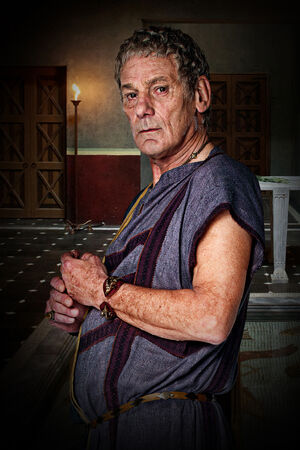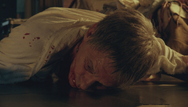| Titus Lentulus Batiatus | ||
|---|---|---|

| ||
| First appearance | S0E03: Paterfamilias | |
| Last appearance | S0E05: Reckoning S2E02: A Place In This World (flashback) | |
| Profession | Lanista | |
| Race | Roman | |
| Relationships | Unnamed Father (Deceased) Quintus Lentulus Batiatus (Son, deceased) Lucretia (Daughter-in-law, deceased) Oenomaus (Gladiator/Friend, deceased) Santos (Body Slave) Magnetius (Top Champion) Titus Calavius (Friend, deceased) Tullius (Friend/Rival, deceased) | |
| Status | Deceased (Killed by Lucretia) | |
| Actor/Actress | Jeffrey Thomas | |
Titus Lentulus Batiatus is the father of Quintus Lentulus Batiatus and Paterfamilias of The House of Batiatus in Spartacus: Gods of the Arena.
Appearance[]
Titus is an old man with a weathered face that can appear both gentle and harsh at times.
Personality[]
A man of honor and discipline, Titus is extremely reverent of Roman tradition and society to the point where he demands the same of those around him. As Quintus mentions to Spartacus, Titus "aspired to be nothing more than a humble lanista". Unlike his son, Titus is humble, patient, respectful, kind, and cautious to all those around him. Also in stark contrast to Quintus' overly condescending leadership style, Titus shows great pride and respect toward his slaves, and believes them of high worth. He is most respectful of the men he trained as gladiators, with a possible exception for Gannicus, who Titus regards as a deviation of his household's honor. The gladiator he respects the most is Oenomaus, whom he has a close relationship with and has valued since Oenomaus was brought to the ludus.
Titus severely disapproves of Quintus's own ambitions, resulting in heavy friction between father and son, which remains a major source of conflict in the prequel. Due to his paternalistic authority and respect for the old ways, Titus is at odds with what he regards as Batiatus breaking from family reputation and tradition.

Titus, in disapproval of his son.
Because of Batiatus' schemes, Titus devotes his energy to restore his family name, as well as his relationship with his son. He is also unapproving of Quintus's marriage to Lucretia, who is of a lower class than her husband, and as a result Titus disregards her. The Paterfamilias of the Batiatus house is shown as being both harsh and soft in his interactions with people. When he returns to his household, many of the slaves and gladiators are happy to see him again and welcome him warmly, particularly Auctus, Oenomaus, and Melitta. On the other hand, he treatsLucretia and Gaia with unconcealed coldness. Despite failing health and advanced age, Titus remains tightly firm to his cause, and wishes to bring back the respect he felt was lost from his house after his son's takeover. However, honeyed wine, his favorite drink, is a weak-point of Titus that is constantly exploited by others to gain his favor. When Lucretia offers him honeyed wine, for instance, Titus warms to her and accepts the gift with pleasure, despite his personal distaste for her.
He is a skilled businessman, and is experienced in dealings of the ludus. When clearing the mess from Batiatus's doings, he and Tullius are able to find a solution to their problem and sort out past transgressions, even though Titus emerges at a disadvantage. Titus remains a reasonable, yet stubborn, man whose dealings reflect his honorable character, no matter the cost; he was even willing to be excluded from the games just for the sake of honoring a request from his close friend Oenomaus.
Titus was once married, and states that the loss of his wife is sorely felt by him each and every day.
Early Life[]
Titus' father founded the ludus, and taught his son its operations. Titus recalled his father taking him to the games and was amazed by them as he watched with his father. He later married and had a son, Quintus, whom he loved though kept at a distance and treated harshly. His wife later passed away, which left him devastated. He disapproved of his son's marriage to Lucretia, and often belittled him, in a misguided attempt to make him stronger.
He took great care in personally selecting those he recruited to be gladiators. At one point, he even

Titus talking to young Oenomaus.
ventured into the Pits and witnessed and was impressed by the unlikely young African fighter Oenomaus. He purchased the African and attempted to mentor him in becoming a gladiator, encouraging him to fight for something other than his own survival. When Oenomaus chose to fight to honor Titus' house, the latter was honored himself, and they develop a close bond following his initiation into the brotherhood.
His ill treatment of Lucretia eventually reaches a breaking point, and she begins to poison his honeyed wine. The poison is not meant to kill him however, but merely make him ill enough to force his retire. Titus eventually moves to Sicily, leaving Batiatus' Ludus in his son's hands, and his health improves in the absence of Lucretia's poison, although all but Lucretia attribute this to a change in climate.
Gods of the Arena[]
Titus spends many months in Sicily recovering his health. However, he receives word from a worried friend, Solonius, who tells him of Batiatus' violent dealings with Tullius. Titus decides to return to his home.

Titus's face.
On arrival, Titus finds the ludus to be in a deplorable state. He discovers Batiatus in bed with both Lucretia and Gaia and calls him angrily to his office, where he tells him that he knows Tullius offered to buy Gannicus and that the ludus has been excluded from the games for denying the offer. He arranges to meet Tullius and Vettius the next morning to try and sort out his son's mess, which he does, but at his son's expense: Gannicus is removed from a Primus match secured by Quintus, and the remainder of the combatants are to be paired against each other. Titus further humiliates his son by openly blaming him for having to make the agreement despite the fact that it was his idea. He also showed Lucretia kindness when she gave him wine, stating he would have his weakness exploited.
Titus is impressed, however, when the gladiator Crixus performs well in the Games by defeating his top man Auctus, and compliments his son in the Gaul's training. He decides to remain in Capua, believing he can help restore the ludus to former glory.
Over the next few weeks, Titus continues to reorder his house and schedule his gladiators in matches. He insists on keeping his tradition of conservative business, though he begrudgingly agrees to Quintus's request to begin training the ludus in the new style of Retiarius. When Quintus later offers to take Titus on a tour of nearby Neapolis to acquire new gladiators, Titus willingly agrees, seeing a chance to strengthen the damaged bond between him and his son. The trip proves pointless, however, as the markets have no worthy stock. Titus, while complimenting Quintus on his initiative, insists on returning home. Upon his arrival, however, Titus is outraged to discover Quintus has misled him: Lucretia has staged an orgy in the ludus in direct defiance of all his policies. Worse still, Lucretia's friend Gaia has been brutally murdered by Tullius in retaliation. An irate Titus orders Gaia' death covered up and then turns his full fury on his son - he orders Quintus to divorce Lucretia or be disowned.
Deciding to clean his house for once and for all, Titus orders a contest of skill to be held between the gladiators: the half with the most wins will be kept in the ludus, the other half will be sold to the Mines. He also insists that Quintus make his choice at the conclusion of the contest. As the new rankings are established, the final match approaches between Crixus and Gannicus. However, Titus decides on a different outcome: he accepts Tullius' offer of purchase of the Gaul. When Oenomaus sides with Quintus to object to the deal, however, Titus decides Gannicus will be sold only if he loses against Crixus. That night, he and Quintus took a walk through the Old Arena, where Titus with his back turned, reminisces on the times with his son just as Batiatus is reaching for a beam to strike and kill him with. However, Titus tells him "You are my son Quintus, and I will always love you no matter the path you take". Batiatus then halts, touched and surprised by his father's words, and asks his father his reason for saying such a thing despite everything that's happened. Titus tells his son of Tullius' offer and says he hasn't given a reply yet as he wants his son to join him. Batiatus says he won't turn from his wife and Titus says he is sorry for everything that's happened to him and begins to walk off. Batiatus calls out to his father and he turns around to see his son with beam in hand. Although slightly worried, Titus waits as his son walks towards him, brandishing the beam, before extending it to him and calls it a memento of days past. Titus accepts it and Batiatus leaves his father alone.
During the match, Quintus arrives and informs his father that he will be leaving with Lucretia. At the same time, Gannicus suddenly allows himself to be defeated, sealing his departure. As Titus makes one last plea to Quintus, he is seized by a rapid attack of coughing, and is carried away to bed.
Titus' health is rapidly declining and he now fears that his time on earth will end soon. On his sickbed, he is nursed by Lucretia and her slaves; as a result of her care,

Titus's death by Lucretia.
Titus finally begins to approve of his daughter-in-law. However, Lucretia unleashes a devastating revelation: she has been poisoning his wine for years, as retaliation for being an incompetent Lanista in her eyes and to enable Quintus to expand beyond his father's shadow. Now because of Gaia's murder, Lucretia informs her father-law that she will kill him and Quintus will murder Tullius and Vettius in "retaliation," as the wine she poisoned was given by Tullius as a gift. Titus puts up a fight and attacks Lucretia, but the extra dosage of poison

Titus attacking Lucretia.
in his drink finally overwhelms him - he crawls weakly on the floor, spewing blood from his nose and mouth, and succumbs to death.
In keeping with Roman tradition, Titus's body is cremated, to the scene of his gladiators in combat. True to their word, Quintus and Lucretia "avenge" their father by slaughtering Tullius' men in a street brawl, burying Tullius alive in the foundations of the new Arena, and stripping Vettius of his ludus and sending him fleeing from the city.
Historical context[]
Nothing is known about the father of the historical Gnaeus Cornelius Lentulus Batiatus. Whether he was a lanista like his son, or if he was adopted into the Cornelii Lentulii before his son, is unknown. It is assumed that the line of Lentulus Batiatus is descended from a freedman of the Cornelii Lentulii, as the Cornelii were a Patrician family, and someone of that family being unlikely to take on the profession of a Lanista, as it was somewhat frowned upon in Roman society.
It is unknown if Batiatus had any brothers, so if he was his fathers only son, his father may have also been named Gnaeus as first born sons in Ancient Rome were almost always named after their fathers.
Trivia[]
- Jeffrey Thomas, the actor who plays Titus, is 183cm (6' 0") tall.
- In stark contrast to his son's overly condescending leadership, Titus Batiatus shows great pride and a manner of respect for his slaves, and holds the games and its traditions in reverence. He has so much respect to his servants that he even remembers their faces, including Barca and Auctus.
- He is one of the only main Roman characters who doesn't seem to have sex with his slaves (or at least, it's not revealed if he ever did). When purchasing Oenomaus in The Pit, the man who is selling him makes a remark about Titus sleeping with Oenomaus if he wants, which leaves Titus looking visibly horrified at the thought. However, it is possible that this only indicates that Titus has no attraction to men. His reaction to the idea of having sex with a female slave is not explored.
- Titus' favorite drink is honeyed wine, and despite his negative view of Lucretia, she can earn his good will by offering his favored drink to him.
- His full name (Titus Lentulus Batiatus) is revealed at his funeral by his son.
- In history, 'Titus' was one of the ten most common Roman personal names.
- It is revealed in Shadow Games that he knew Magistrate Titus Calavius and Calavius mentions to Batiatus that his father was a true Roman who knew his place.
- Titus' middle name, Lentulus, may signify that his family are traditional clients of the Patrician House of Lentulus, who are members of the Gens Cornelia. The House of Batiatus may descend from freedmen of the House of Lentulus.
- As a relation of the Gens Cornelia, Titus' full name should be Titus Cornelius Lentulus Batiatus.
- Jeffrey Thomas and Lucy Lawless (Lucretia) both appeared as major recurring characters on Hercules: the Legendary Journeys, Thomas as Jason and Lawless as Xena. Thomas also has a brief cameo in an episode of Ash vs. Evil Dead as an auctioneer who ironically meets his end at the hands of Ruby, played by Lawless. Thomas also co-starred alongside Peter Feeney (who played Quintilius Varus) in the season 2 episode Once a Hero.
Quotes[]
"You seek to ply me with honeyed wine? ... You find my weakness, and I would have it exploited."[1]
―Titus to Lucretia
"A champion is more than his victories upon the sands. He is the sum of his actions. Every decision, no matter how small, speaks to the man, and the balance of his heart."[2]
―Titus to Batiatus
"Do not look to him! I AM THE DOMINUS OF THIS FUCKING HOUSE! See it done!"
[2]
―Titus violently reasserts his authority to Lucretia
"I would witness the games here, among the people, with son beside me."[2]
―Titus to Batiatus
"Tell me you're not the serpent I thought you to be."
―Titus to Lucretia